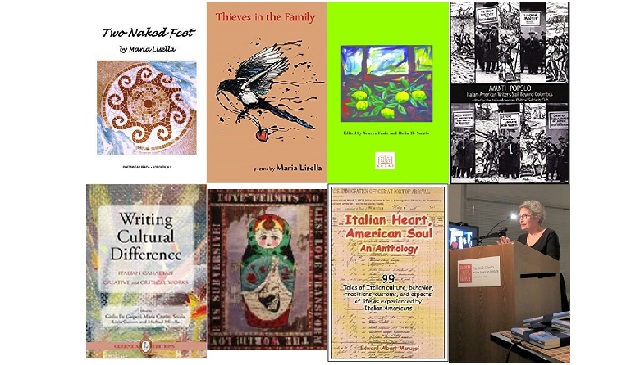Interview by Tiziano Thomas Dossena
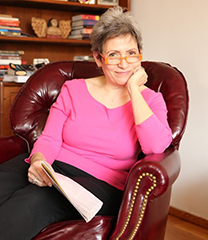 Maria Lisella is the sixth Queens Poet Laureate and the first Italian American to be named so. Her Pushcart Prize-nominated work appears in Thieves in the Family (NYQ Books), Amore on Hope Street (Finishing Line Press) and Two Naked Feet (Poets Wear Prada). Her work has appeared in New Verse News, The New York Quarterly, Ovunque Siamo, Paterson Literary Review, Skidrow Penthouse, and Shrew. Work has also been published in recent anthologies such as The Traveler’s Vade Mecum (Red Hen Press, 2017) while her essay, Shades, Colors and Internal Dialogues appears in What Does It Mean to Be White in America? (2LeafPress) and her travel piece, Lemmings appears in the five-volume collection She Can Find Her Way (Upper Hand Press, 2017). She co-curates the 27-year old Italian American Writers Association literary series. By day, she is a NY Expert for USA TODAY, Europe Editor for Travel Market Report and contributes to the bilingual, La Voce di New York.
Maria Lisella is the sixth Queens Poet Laureate and the first Italian American to be named so. Her Pushcart Prize-nominated work appears in Thieves in the Family (NYQ Books), Amore on Hope Street (Finishing Line Press) and Two Naked Feet (Poets Wear Prada). Her work has appeared in New Verse News, The New York Quarterly, Ovunque Siamo, Paterson Literary Review, Skidrow Penthouse, and Shrew. Work has also been published in recent anthologies such as The Traveler’s Vade Mecum (Red Hen Press, 2017) while her essay, Shades, Colors and Internal Dialogues appears in What Does It Mean to Be White in America? (2LeafPress) and her travel piece, Lemmings appears in the five-volume collection She Can Find Her Way (Upper Hand Press, 2017). She co-curates the 27-year old Italian American Writers Association literary series. By day, she is a NY Expert for USA TODAY, Europe Editor for Travel Market Report and contributes to the bilingual, La Voce di New York.
L’Idea: How do you feel about having the honor of being the Queens Poet Laureate and the first Italian American to be so named?
Maria Lisella: As the first Italian American it feels like the perfect match: Italy is a multi-cultural country where more than 200 dialects are still spoken or being preserved while Queens is the most multi-cultural borough in America where about 140 languages are spoken.
Italian Americans have been part of the fabric of America for many generations and its cultural and literary legacy has often gone under the radar. Beyond Mario Puzo and Don DeLillo, many Italian Americans are not familiar with Italian American authors. Literature can help to banish or diminish negative stereotypes since authors present a plurality of images so it is imperative to read.
I would love to see organizations such as the Sons of Italy or the National Organization of Italian American Women to take up this mantle and support Italian American authors by buying and giving a book away with each membership to encourage Italian Americans to read our books.
The three rules of the Italian American Writers Association (IAWA) are: Read each other, Write or be written and Buy our Books, to which I would add, Review each other because if book are not reviewed they wither on bookshelves.
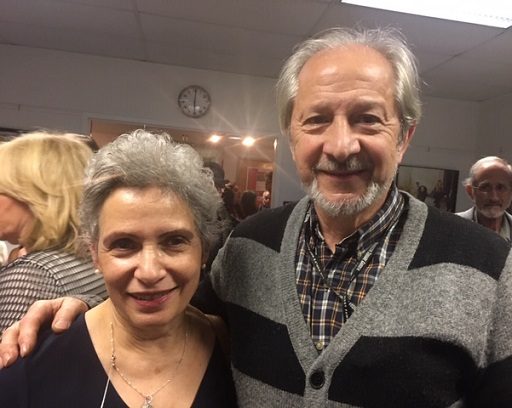
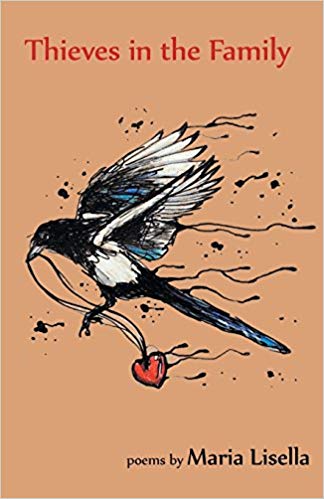 L’Idea: Your collection’s title is Thieves in the Family. Can you tell us why?
L’Idea: Your collection’s title is Thieves in the Family. Can you tell us why?
Maria Lisella: Thieves in the Family (NYQ Books) was the title my mentor Diana Festa thought sounded stronger than Small Victories, which was the original title. On the surface, the poem is about a small theft — lily bulbs and herbs from a garden – but that act represents the petty resentments that bubble under the surface of a family often disrupting relationships.
Additionally, the two protagonists – the aunt, my mother, and the nephew – are engaged in cultural thievery. He steals the lilies from her mother’s garden, a legacy that links my mother to the earth of her Calabrese ancestors, while the nephew’s racist remarks expose him as either ignorant of the prejudice lodged against Sicilians in Italy or he is anxious to pick on the next group of color, in this case a Latin sister-in-law and African Americans to elevate his own sense of himself in an artificial and disingenuous way.
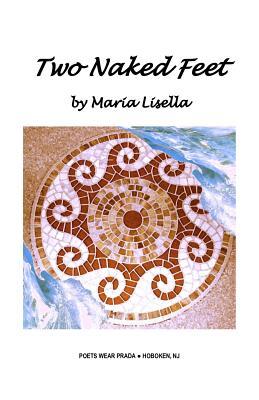 L’Idea: Are your poetry collections chronology or theme-based? What is the main the inspiration for your poetry?
L’Idea: Are your poetry collections chronology or theme-based? What is the main the inspiration for your poetry?
Maria Lisella: My work reflects the passages of my life. My intention is to write with enough specificity to illustrate the experiences as genuine and particular, but general enough so that others can say, I have felt that way too, thus sharing feelings and recognizing some aspect of the human condition we may all have in common.
I can explore these passages through the many roles I play: partner, wife, friend, stepmother, sister, daughter, in addition to my public roles, all of which feed my creative work.
My late husband, Gil Fagiani, pursued a given period in his life and write to that time; I tend to jump around. Right now, I am coping with a tragedy – my youthful husband’s recent death. I am grappling with grief and I am learning about facets of myself I did not know existed. Because so many women are widows, my work has brought me closer to a wider audience.
Everything and anything can be a source of inspiration – I read everything, from cereal boxes to instructions on shampoos (often now with the back story to the product) and I read classical authors, poetry and prose in English and sometimes Italian. You never know what might kick off a memory, a dream, a stream of consciousness that will feed a poem.
L’Idea: Besides being a recognized poet, you are also a renowned travel writer. How did you start in this profession? Do you travel to write or do you write about your travels?
Maria Lisella: It is an odd profession for me in a way as I am an incredibly rooted person — I have always lived in Queens, New York and I attended commuter colleges — CUNY’s Queensborough, Queens, and NYU-Polytechnic.
The leap into the travel industry was fortuitous. I was part of a research team working for a travel columnist whose work was featured in Travel & Leisure. Eventually I began to work as a freelancer for that magazine, stayed a few years and moved to the travel trade, Travel Agent magazine as the International Editor.
During my 30-plus years of covering the industry, I visited more than 60 countries. The travel trade is a dynamic platform for travel professionals to exchange information. While tourism is one of the largest industries in the world, it is also an informal industry where knowledge is shared among professionals, at conferences and seminars while many are not formally trained. I have also taught about the Hospitality industry.
Travel is a life-changing experience that has the capacity to change minds. The more people travel outside their hometowns, be it to other states or other countries, the more they can learn about others — their lifestyles, cultures and that experience can encourage tolerance and understanding.
Currently, I write for Travel Market Report, USA Today, The Jerusalem Post and La Voce di New York. 
In answer to your second question, I do both — I write about my travels for articles for work while I also travel to write.
Right now, I am in Calabria, Italy as a participant in the first session of the Italian Diaspora Studies Association, organized by Professor Margherita Ganeri. The program is essentially a Writing Seminar that combines Heritage and Memory. American Book Award winner Maria Mazziotti Gillan leads the poetry workshops while Connie Guzzo McParland, President of Guernica Editions and Professor Ganeri lead the second week showcasing prose and fiction writing. So in this case, I traveled specifically to write.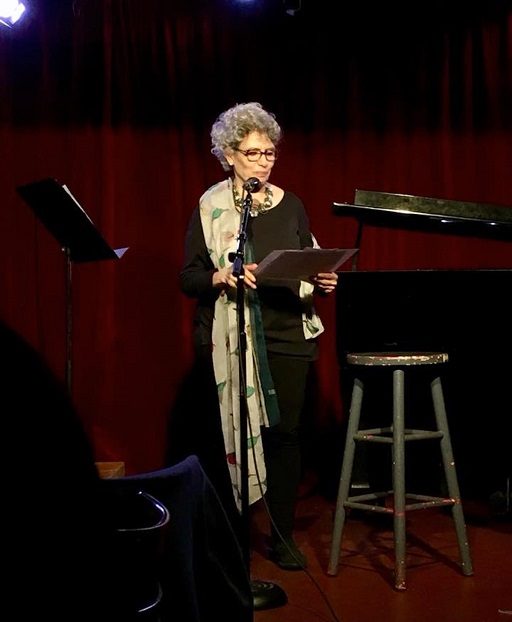
L’Idea: Do you feel that being a poet influences much of your outlook and observations about travel? What about the other way around? Does your experience on travel influence a lot your poetry?
Maria Lisella: Being a poet is part of my DNA just as being a journalist is, and the two inform each other. My travel assignments have afforded me opportunities to travel to unknown places and meet strangers in their own homelands. The impulses to query, win trust and clarify are common to both forms of writing.
My travel trade work is factual, I don’t write in the first person although what I observe is inevitably filtered through my consciousness as a poet and many of my poems are what I call outtakes from the travel articles.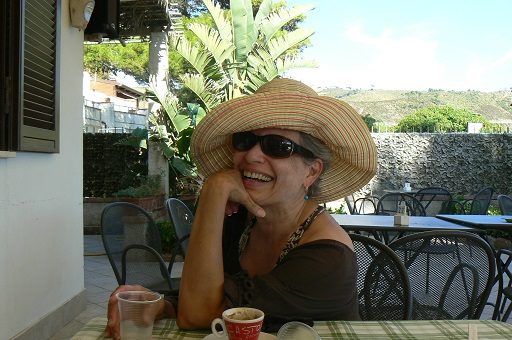
For example, I might interview someone such as I did in Mad with Fear based on a guide’s experience during the conflicts in Croatia in the 1990s; or the poem La Nebbia Veneziana or Fog in Venice reflects my visions as I floated in a pool of hot water in the middle of Carnevale in February in Venice; and Lovestuck is about a visit to the Borghese Galleria. Several other poems about Portugal and Spain are also based on visits to those places usually for a work assignment.
These are stories that would never find a place in my travel articles. However, when I write for La Voce di New York, which is read by a consumer audience, I have can intersperse my personal observations as I did in a recent review of the Leonard Cohen exhibit currently at the Jewish Museum in New York.
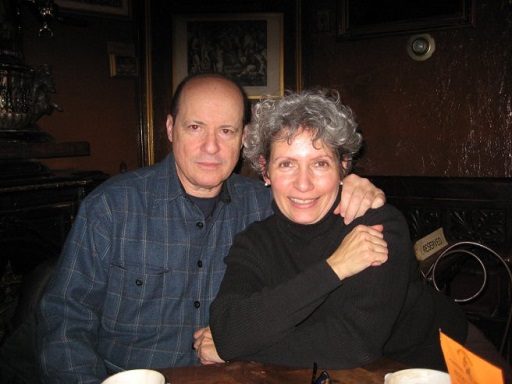
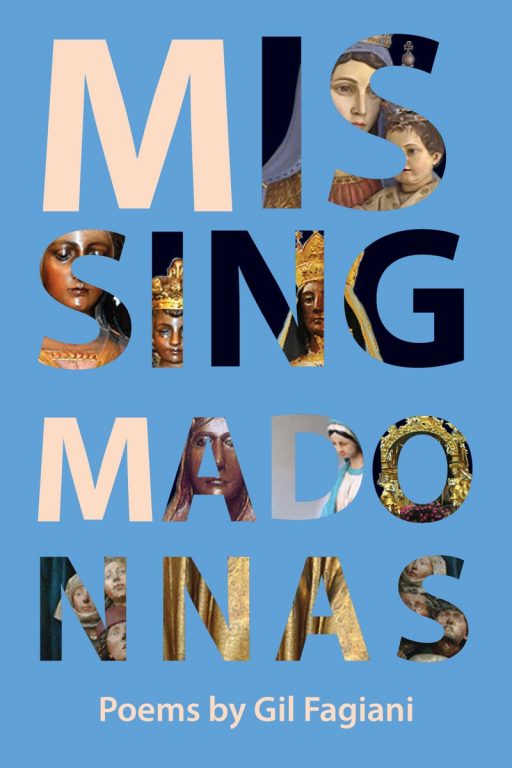 L’Idea: You recently launched Missing Madonnas, by Gil Fagiani, your husband. Could you tell us more about that?
L’Idea: You recently launched Missing Madonnas, by Gil Fagiani, your husband. Could you tell us more about that?
Maria Lisella: Missing Madonnas is his first posthumous collection; there will be more books as Gil was very prolific and productive. He left three unpublished manuscripts on his desktop, a memoir that is now being considered by a publisher and a collection we began together.
Missing Madonnas is the last in his Connecticut trilogy — Chianti in Connecticut and Stone Walls (Bordighera Press) — is an extraordinary collection that, in part, focuses on his mother’s Sicilian family from Capo d’Orlando but also presents vibrant characters who have seen the world from the bottom up. His work is often about faith, hope, love, and redemption — he had a strong belief in the human spirit’s power to transform its destiny.
Of Missing Madonnas Grace Cavalieri wrote in the Washington Review of Books: The downtrodden and discouraged were transformed by poems, and the exhilaration and beauty of his people are documented forever. His poems teach us to notice, to look on every chain-link fence for the lock; to value the original language of our families; to remember the mores that raised him. These poems are stories — showing the way Fagiani saw the world: funny, unpredictable, sometimes harsh, and also kind.
L’Idea: I know you co-curated the literary readings for the Italian American Writers Association (IAWA) with Gil. Were you working on any other projects in common with him?
Maria Lisella: During Gil’s hospital stay — the last two months of his life — we began a joint poetry collection that I have yet to organize or name.
We were also co-founders of the Vito Marcantonio Forum, which currently just presented a dramatization and presentation in Marcantonio’s family’s hometown of Picerno, Basilicata. A book presentation is scheduled for Wednesday, May 29 at the NYPL on Mulberry St. and on June 23, the VMF will present the VMF award to Manhattan Borough President Gale Brewer.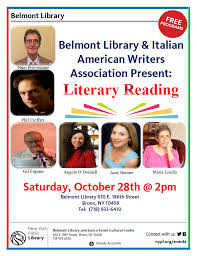
L’Idea: Could you tell us more about these readings and IAWA?
Maria Lisella: At 28 years old, the IAWA reading is likely one of the longest running literary series in New York City. Each month it begins with an Open Mic where anyone can read followed by two featured Italian American authors and book signings and sales.
Through IAWA’s readings I have personally watched many writers move from being novices to becoming widely published authors and publish books, which is immensely gratifying.
Since Gil’s passing am grateful for several of the regular attendees who share hosting, posting, scheduling and promoting the readings. These are transferable skills authors can use to support their own work.
My mantra is, if you want an audience, you also have to be an audience. That etiquette is necessary to the success of the entire community.
L’Idea: Any new projects in the near future?
Maria Lisella: I have two collections in the pipeline, am looking more closely at the art of writing short stories and have Gil Fagiani’s work to continue publishing and getting out into the world.
I am always interested in discovering new outlets for my creative work and my reporting; as well as expanding the subjects I cover.
L’Idea: A message for our readers?
Maria Lisella: Try to think as a community — this does not mean we have to agree on everything, but it does mean we need to support each other’s achievements and to sharpen our knowledge of our heritage; to trade stereotypes including that we were the perfect immigrants, to embrace plurality within our community. Create book clubs that focus on various aspects of Italian Americans in America —to learn from each other.
I would add, we could step it up a bit when it comes to cultural philanthropy. Support authors, support institutions such as the John D. Calandra Italian American Institute that has become a dynamic think tank about our culture in America; the Vito Marcantonio Forum, IAWA, and NYU’s Casa Italiana, all of these offer educational experiences, mostly for free.


